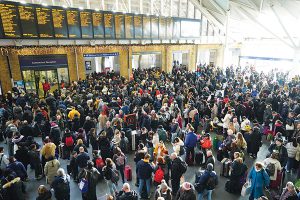Bloomberg
Prime Minister Rishi Sunak’s spokesman, Jamie Davies, told reporters the government acknowledges the strikes hitting the UK are causing “massive disruption.â€
“If you look at rail specifically, it has hindered people’s ability to go to work, to get to school, to go about their daily lives,†Davies said. “We want the strikes to end; we don’t want to see the current level of disruption to continue.â€
The government’s comments came as Border Force workers and railway staff launched
fresh strikes, leaving passengers, shoppers and commuters facing potential delays. Meanwhile, nurses and ambulance workers are planning further industrial action in January after striking earlier this month.
Work continues on new legislation to curtail public sector strikes, though Davies said he had no update on when that might be published. He reiterated Sunak’s stance against large pay increases, which he said would stoke inflation, while emphasizing the government wants the unions and employers to negotiate a “fair†settlement.
The Public and Commercial Services (PCS) Union, which represents Border Force staff, began a walkout until New Year’s Eve, with military personnel and other civil servants brought in to cover for striking workers at six airports.
These contingency arrangements helped to avoid lengthy lines at passport control over the Christmas weekend, during an earlier four-day walkout. The PCS is demanding a 10% raise for members, far above the 2% for civil servants offered by the UK government.
There have been limited
delays so far at the affected
hubs, which include Heathrow, Gatwick, Manchester, Birmingham, Cardiff and Glasgow, as well as the port of Newhaven.
Heathrow Airport said operations continued to run smoothly. “The immigration halls are free flowing with Border Force and the military contingency providing a good level of service for arriving passengers,†it said.
The strikes will also run for four days, and the PCS said the full extent of the disruption was hard to predict, partly because military personnel were not authorised to detain suspected criminals at passport control.
“The government says its top priority is our country’s security, but the evidence at our airports during the strikes tells a different story,†PCS General Secretary Mark Serwotka said.
The UK Home Office said that non-striking Border Force staff, with a “full range of appropriate powers,†were continuing to complete their roles — and had been “spread flexibly†to ensure there was sufficient cover. “Military personnel, civil servants and volunteers are supporting a range of services and all deployed contingency staff are sufficiently trained for the activities they are required to undertake.â€
Passengers travelling by train have reported more severe disruption, with crowds left waiting at transport hubs across London after the rail network struggled to recover from overrunning engineering work after members of the National Union of Rail, Maritime and Transport Workers went on strike between Christmas Eve and December 27.
The TSSA members are on strike over pay, job cuts and changes to their employment terms and conditions. There are no signs yet of a deal.
 The Gulf Time Newspaper One of the finest business newspapers in the UAE brought to you by our professional writers and editors.
The Gulf Time Newspaper One of the finest business newspapers in the UAE brought to you by our professional writers and editors.
